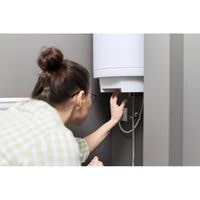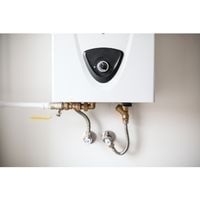How to tell if water heater is gas or electric. There are different kinds of water heaters and finding out what kind you have can be achieved with a few kitchen tools and a cup.
There are a variety of water heaters on the market, though gas or electric is the most common.
You can know what type of water heater you have by either checking switch settings or knowing your equipment inside and out if it’s not labeled.
Whether you need to replace your current hot-water heater, install an additional one in another room, or find out more about your basement heater so that you’re safe when working down there take a look at these steps to find out.
How to tell if water heater is gas or electric

A water heater is an invaluable appliance designed to heat water at home.
It’s important that you know how to check gas or electric water heater so as to avoid any dangers.
First of all, you will want to take an equipment inventory and make sure it’s in good working order.
One way to do this is by closing the main valve on the top of the tank.
You can also shut off the supply line from your home’s cold-water pipe, though this may not be practical if the water heater is placed in a hard-to-reach area with no access panel.
Close the outlet valve to your hot-water faucet using a wrench and remember that it may become very hot if there is residual pressure inside the tank; be prepared for burns when trying to shut it off.
Identifying the differences
To determine if a water heater is electric or gas, first, you will want to locate the panel on the side of the unit.
If there happens to be a blue flame next to the access panel, this is an indicator that it is a gas model.
These types of water heaters are generally larger in size than electric ones and may come with more air vents.
When taking into consideration the venting, you can also look for two cords connected to an electric water heater that pumps hot water throughout your home.
You should also see this if you simply open up your access panel and look at it from top-down.
Gas Water Heaters
Gas water heaters run on gas and usually propane or natural gas. A burner located at the unit’s base is lit by a pilot light, refiring into the water piping and creating heat via combustion.
However, because of its chemical process, harmful emissions like carbon dioxide, carbon monoxide, and nitrogen oxide inevitably build up in its own flue (or chimney), which causes it to lose efficiency.
As you are able to identify these toxic gasses as well as signs of burnout like draft hoods, vents, or flues outdoors you know that your gas-powered water heater should be immediately serviced by a plumbing expert who can properly deal with any technical glitches causing the built-up of potentially deadly gasses.
Electric Water Heaters
Unlike Gas water heaters that use a gas source and ignition to heat water, electric heaters typically use electricity that travels through electrical coils or wires.
The water inside the water heater tank is cold until the heating elements like alternating current warm up the water.
Electric water heaters are typically controlled by either thermostats or microprocessor control modules, but some older versions may still rely on less advanced technologies like limiting switches.
Heating elements (or electrodes) in electric heaters can be either stainless steel or copper, depending on the make and model of a unit.
Can a water heater be both gas and electric?
Both gas and electric water heaters can be either wall-mounted, floor-standing, or inset into the countertop.
Each of these heater models has a different storage tank that holds anywhere from 20 to 50 gallons.
They are easy to find at any hardware store in your area, but they do tend to cost more than other water heater types and often require professional installation.
Consider saving some money by going with a tankless model instead. Tankless and hybrid heaters tend to be much more efficient than the traditional storage tank varieties.
Will a gas water heater work without electricity?
Gas water heaters utilize a continuously running pilot light and should work in a power outage, unlike electric ones which need to be plugged into the wall.
While it’s true that an electric water heater with an empty tank may not keep up with demand in the event of a blackout, you can always manually turn on the gas valve to ignite it whenever you need hot water.
Is it OK to turn off an electric water heater?
It’s not always necessary to turn off the water heater, but it also won’t hurt, either. But there are two circumstances.
When one should absolutely turn the water heater off to prevent any dangerous back pressure build-up. The tank is empty (or close to it) and won’t be refilled for a long time.
How to tell if water heater is gas or electric
Related Guides
